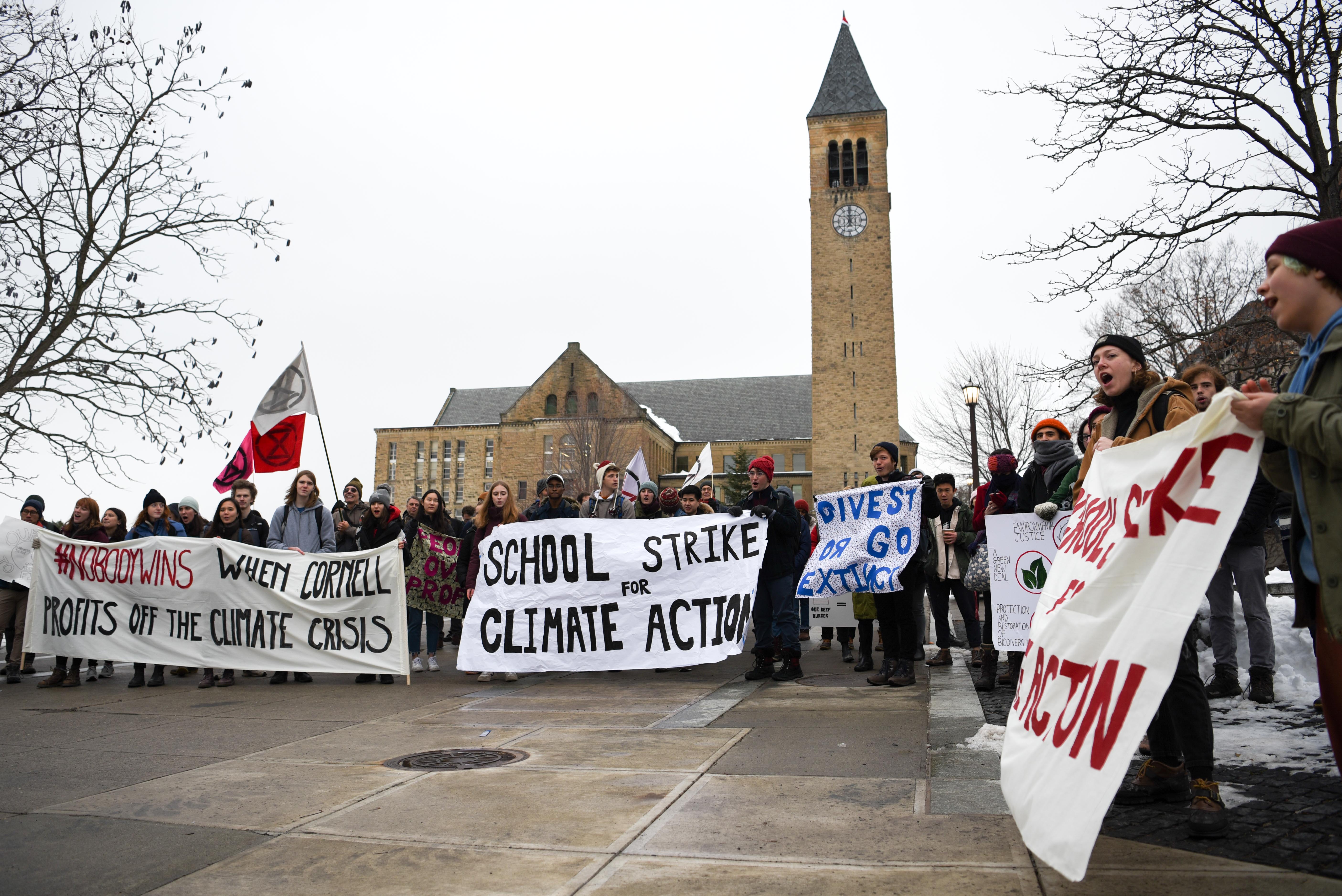As calls for fossil fuel divestment escalate, the protesters have moved from the sidewalks to the streets.
On Friday, a coalition of student activist groups flooded Ho Plaza. These groups included Climate Justice Cornell, the Young Democratic Socialists of America chapter at Cornell, the Vegan Society and the Ithaca chapter of the Extinction Rebellion. Organizers gave speeches and led chants, and then the crowd marched through the streets before returning to Day Hall to stage a sit-in.
“A non-profit university should not act like a corporation,” Nadia Vitek ’19, an organizer for Climate Justice Cornell, told the crowd as she advocated for divestment from fossil fuels.
In Day Hall, four students delivered a letter from Climate Justice Cornell and a larger list of demands to President Martha Pollack’s receptionist. While the president did not receive the demands, 12 protestors waited outside Martha Pollack’s office until 5 p.m., and conversed with CUPD and Vice President of Student and Campus Life Ryan Lombardi. The groups are in the process of scheduling a meeting with President Pollack.
The CJC letter demands the divestment from all fossil fuel companies by Fossil Fuel Divestment Day — Feb. 13, 2020. If this demand goes unmet, the protestors threaten to disrupt “business as usual” on the Cornell Ithaca campus until the Board of Trustees pledges to divest.
Protestors downstairs staged a sit-in of the Day Hall lobby until 4 p.m. Many protestors left to attend classes and prepare for finals, but some remained throughout the day.
Leaderboard 2
Efforts to maintain a presence in the building were stymied by CUPD’s decision later in the afternoon to not allow protestors back into the building if they left to use the bathroom or get food.
Video calls connected the protestors who were stuck outside, those in the lobby and those outside the waiting room to Pollack’s office, while faculty and students with appointments in the building were escorted in and out by CUPD.
In the lobby of Day Hall, protestors sang movement songs, did group bonding exercises and worked on social media content for their groups. With three CUPD officers — present throughout the sit-in — looking on, protestors took turns reading from a Martin Luther King speech, “Remaining Awake through a Great Revolution.”
Newsletter Signup
“The Cornell University Police were not notified of yesterday’s protest but still managed to redirect traffic in order to ensure participants’ safety when the protest unexpectedly moved into the streets,” Chief of Cornell University Police Dave Honan told The Sun in a statement.
“When the protestors entered Day Hall and interrupted the normal business operations of offices in that building, the Cornell University Police secured the building to maintain operations and then assisted students and staff needing access to the various offices and services in Day Hall,” Honan’s statement continued.
As Climate Justice Cornell has forged partnerships with other groups including the Young Democratic Socialists of America and the Vegan Society, the movement’s list of priorities has expanded.
The larger list of demands includes not only divestment and decarbonization of the university’s resources, but also the expansion of plant-based protein options in Cornell Dining, a Citizen’s assembly to increase power sharing, and investment in and and orientation education about the the peoples of the Cayuga Nation.
“This protest is explicitly anti-capitalist. Eco-socialism or extinction,” Gregory Randazzo ’22 told The Sun.
Regardless of student sentiment about capitalism, students said that the unhappiness of environmentally minded alumni may not bode well for the university’s bottom line.
“I will not donate to the university until they divest,’’ Sheila Out ’72, an Ithaca resident and Cornell alumna who attended the rally, told The Sun.
As the rules currently stand, the process for implementing divestment will be complex. In 2016, the Cornell Chronicle reported on the new standard that the Cornell University Board of Trustees approved to guide its divestment decisions.
According to the Chronicle, the board’s current standard is that divestment will only occur when a company’s actions are “morally reprehensible” and divestment will have a real impact on the issue at hand without too many unintended consequences, or when the company contributes to a problem so serious it conflicts with the university’s goals and principles.
If divestment is not implemented, activists’ tactics may continue to escalate.
“We are choosing confrontation after fruitless attempts of working with the administration and a failed vote by the Board of Trustees,” CJC wrote in their letter to President Pollack.









